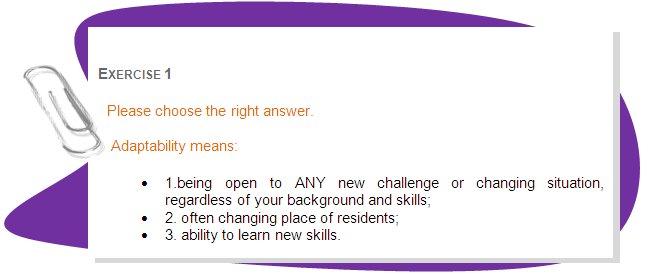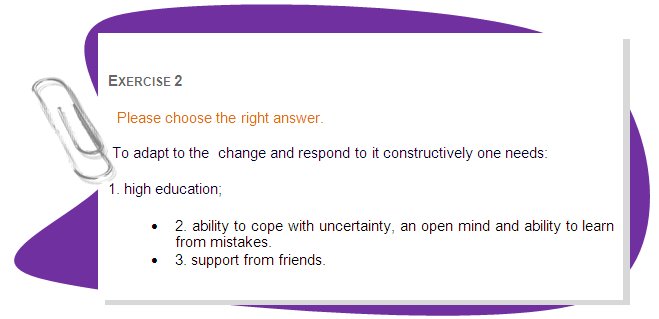Key Competencies Kit
for Facing Lifelong Learning


 |
This Project has been funded with support from the European Commission. This communication reflects the views only of the author, and the Commission can not be held responsible for any use which may be made of the information contained therein. |
 |
Didactic Unit 6 |
Theme |
Time |
Be adaptable |
|
2 hours |
|
||
|

What does is mean to be adaptable, and why is it important? This is one of the skills holding many people back from achieving what they are capable of. It manifests itself in statements like “I don’t know how to do that”, or “that would be too hard”, or simply displaying poor results when taking on a new challenge.
However, life is all about change, and if you don’t keep pace with that change you will be left behind. Running from change is a big problem for many people. Change is a non-negotiable part of living in reality. Like surfing a giant wave, it's much easier to swim with it than try to fight it.
Adaptability means being open to ANY new challenge or changing situation, regardless of your background and skills, and refusing to place preconceived judgments on the challenge or presume it’s something you can’t handle, or won’t like.
Being adaptable can lead to great things; such learning new skills, finding new job, improving relationships, and generally being happier when you see what you truly are capable of.
When you look and listen to the people around you, you get the impression that many of them are t afraid of change. You can see it in the way they stay in abusive relationships, do not learn despite lack of education and skills and many other similar situations.
Change is frightening because it can mean we do not know what is coming next. Even positive change can cause great anxiety. What is it about change that frightens us all so much? Change brings uncertainty.
To adapt to the change and respond to it constructively one needs:
There are positive steps that you can take to cope with the uncertainties. To start with accept that some things in life are uncertain. There is nothing that you can do about them and you sometimes have no control over certain situations.
When you have accepted that you cannot avoid uncertainties you need to learn how to cope when something uncertain does happen.
1. Start to recognize that a lot of things around are uncertain in your everyday life.
Everything from little things like telephone call that you may receive today, through to much larger things like whether you will succeed in finding a job this week or whether the company you work for will still exist next year.2. Don't worry about the things you cannot change.
A lot of our uncertainty comes from being worried about things we plain cannot change. So if whatever it is you're uncertain about is something you can't affect anyway, you need to reprogram your mind to stop panicking about it.3. Try to put whatever has happened into perspective.
Is it something that can be dealt with quickly. Or is something that will need a little more work on it? Or is it something a lot more serious? When you think about events in these terms it can be easier to deal with them.

Ability to learn from mistakes is very important for strengthening adaptability to changes.
 |
You can only learn from a mistake after you admit you have made it. As soon as you start blaming other people, you distance yourself from any possible lesson. But if you courageously stand up and honestly say “This is my mistake and I am responsible” you will have all chances to learn from mistakes and avoid them rather than cope with their consequences. |
 |
Learning from mistakes requires:
|
|


 |
Answers to the questions and exercises of Didactic Unit 6 |
1.
2